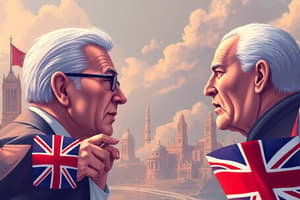Podcast
Questions and Answers
Which of the following best defines global politics?
Which of the following best defines global politics?
- The study of domestic policies within individual countries.
- Interactions among countries and political entities on a global scale. (correct)
- Cultural exchanges that enhance international relations.
- Economic strategies that affect global markets.
What is a primary focus of foreign relations?
What is a primary focus of foreign relations?
- Managing relationships with other countries. (correct)
- Developing domestic infrastructure.
- Conducting historical research.
- Promoting local cultural practices.
Which of the following issues is NOT commonly associated with conflict zones?
Which of the following issues is NOT commonly associated with conflict zones?
- Humanitarian crises.
- Refugee movements.
- Economic prosperity. (correct)
- Political instability.
What is a key role of international economic organizations like the IMF?
What is a key role of international economic organizations like the IMF?
Cultural diplomacy primarily seeks to achieve which of the following objectives?
Cultural diplomacy primarily seeks to achieve which of the following objectives?
Which of the following statements accurately reflects socio-economics?
Which of the following statements accurately reflects socio-economics?
Which aspect is NOT typically part of foreign relations strategies?
Which aspect is NOT typically part of foreign relations strategies?
What type of issues do international organizations like NATO primarily address?
What type of issues do international organizations like NATO primarily address?
In the context of conflict zones, which concern is most critical?
In the context of conflict zones, which concern is most critical?
Flashcards are hidden until you start studying
Study Notes
Global Politics
- Defines the interactions among countries and political entities on a global scale.
- Influenced by power dynamics, governance structures, and international organizations (e.g., UN, NATO).
- Key issues include democracy promotion, human rights, and climate change.
Foreign Relations
- Refers to how a country manages its relationships with other countries.
- Encompasses diplomacy, trade agreements, and alliances.
- Strategies include bilateral and multilateral negotiations, treaties, and foreign aid.
Conflict Zones
- Areas experiencing armed conflict, social unrest, or political instability.
- Examples include Syria, Ukraine, and Afghanistan.
- Key concerns involve humanitarian crises, refugee movements, and international intervention.
International Economics
- Studies the economic interactions between countries.
- Focuses on trade policies, exchange rates, investment, and economic development.
- Organizations such as the IMF and WTO play crucial roles in managing economic relations.
Cultural Diplomacy
- Utilizes cultural exchanges to foster mutual understanding and relations between nations.
- Involves art, education, sports, and heritage programs.
- Aims to improve international image and promote national interests.
Socio-economics
- Examines how economic activity affects and is shaped by social processes.
- Key topics include income inequality, education, and employment.
- Impacts international relations by influencing stability and development strategies.
Global Politics
- Encompasses interactions among nations and political entities on a worldwide scale.
- Shaped by power dynamics, governance structures, and the influence of international organizations like the United Nations and NATO.
- Central issues include the promotion of democracy, protection of human rights, and responses to climate change.
Foreign Relations
- Defines how a nation navigates its interactions with other countries.
- Incorporates diplomacy, trade agreements, and the formation of alliances.
- Employs strategies such as bilateral and multilateral negotiations, formal treaties, and provision of foreign aid.
Conflict Zones
- Identified as regions plagued by armed conflicts, social unrest, or political volatility.
- Notable examples are Syria, Ukraine, and Afghanistan.
- Major concerns in these areas include humanitarian crises, movement of refugees, and the need for international intervention.
International Economics
- Investigates economic interactions among countries and their implications on the global market.
- Key focus areas include trade policies, fluctuations in exchange rates, foreign investment, and pathways to economic development.
- Organizations like the International Monetary Fund (IMF) and the World Trade Organization (WTO) play significant roles in regulating and facilitating economic relations.
Cultural Diplomacy
- Employs cultural exchange as a means to enhance mutual understanding between nations.
- Involves initiatives in art, education, sports, and preservation of heritage to build relationships.
- Aims to project a positive international image while advancing national interests.
Socio-economics
- Studies the interplay between economic activity and social factors.
- Key areas of concern include income disparity, the role of education, and employment issues.
- Influences international relations as social conditions can affect national stability and strategies for development.
Studying That Suits You
Use AI to generate personalized quizzes and flashcards to suit your learning preferences.




